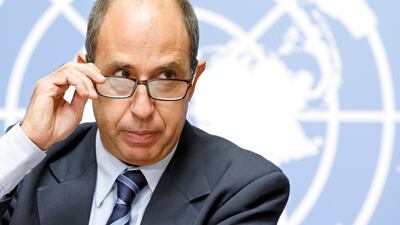Any progress in the nuclear and security dialogue with North Korea at upcoming summits must be accompanied by discussions on improving human rights, the UN investigator on the isolated country said on Monday.
US President Donald Trump has agreed to meet with North Korean leader Kim Jong Un by the end of May to discuss the future of nuclear weapons programme. The two Koreas will hold a summit by the end of April, at the "truce village" of Panmunjom on their border.
"Today, we witness what appears to be a potential for rapid progress on the political and security front, with communication channels steadily building up between the two Koreas as well as the United States of America, and historical summits plans for the future," Tomas Ojea Quintana, UN special rapporteur on human rights in the Democratic People's Republic of Korea (DPRK), told the world body's Human Rights Council.
Referring to "this critical moment", he added: "Let me urge the DPRK to consolidate this rapprochement with a parallel opening to human rights review. My main message today is that any advancement on the security dialogue should be accompanied by a parallel expansion on the human rights dialogue."
"The country's extensive penitentiary system and severe restrictions on all forms of free expression, movement and access to information continue to nurture fear of the state and leave people at the mercy of unaccountable public officials," said Mr Ojea Quintana.
_______________
Read more:
Comment: After the photo-ops and the platitudes ... North Korea will not disarm or denuclearise
North Korean experts fret at Donald Trump's go-it-alone approach to meeting Kim Jong-un
Comment: How Kim Jong-un is following the playbook of his father
_______________
The delegation of North Korea, which does not recognise Mr Ojea Quintana's mandate, did not attend the debate in Geneva. It denies accusations of committing widespread rights abuses against its people.
Mr Ojea-Quintana heads a group of independent experts tasked by the UN Human Rights Council with finding practical ways to hold rights violators in North Korea accountable.
A 2014 UN Commission of Inquiry (COI) report on human rights in North Korea stated that systematic, widespread, and gross human rights violations committed by the government included murder, enslavement, torture, imprisonment, rape, forced abortion, and other sexual violence, and constituted crimes against humanity.
In 2015, the UN Security Council discussed North Korea’s bleak human rights record as a formal agenda item for the second year in a row.
Human Rights Watch has called North Korea "one of the most repressive authoritarian states in the world, ruled for seven decades by the Kim family and the Worker's Party of Korea".
Jason Mack, a first secretary at the US mission to the United Nations in Geneva, denounced extrajudicial killings, enforced disappearances, torture, arbitrary arrests, sexual violence and forced labour in North Korea.
"Many of these abuses are committed in political prison camps where an estimated 80,000 to 120,000 individuals are detained, including children and family members of the accused," Mr Mack told the Geneva forum.
"The DPRK also uses forced labour including export of North Korean workers and child labourers to underwrite the regime's illicit weapons programmes," he added
The European Union voiced deep concern at continuing violations, saying "some of which may amount to crimes against humanity".
